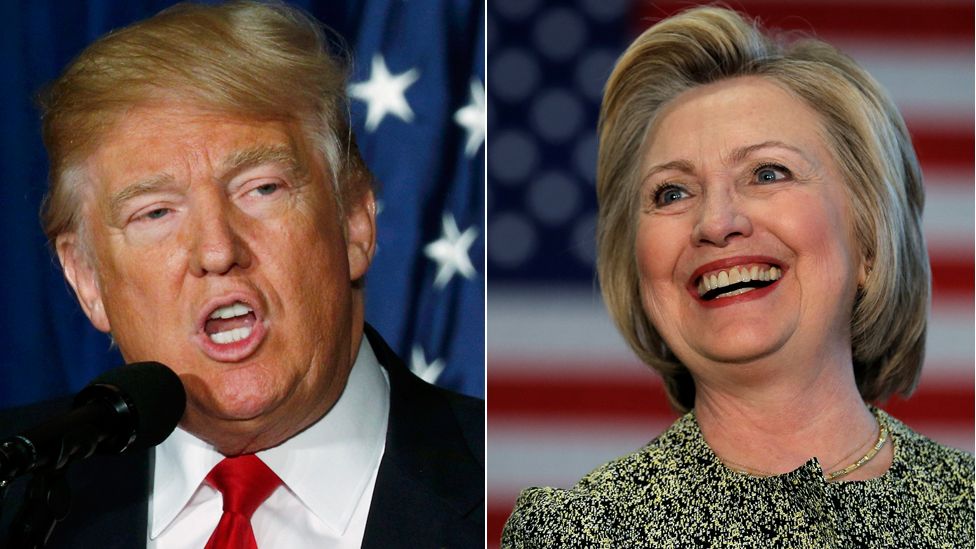US election 2016: Six reasons it will make history
- Published

It took a while, but now we finally know which two candidates will fight it out in the race for the White House.
Donald Trump will be the Republican candidate, something few would have predicted a little more than 12 months ago.
And after the Democrats' convention in Philadelphia, we know Hillary Clinton will be their candidate.
Whatever happens from this point on, the outcome will be historic. This is how:
1) Twilight years
When Barack Obama first walked through the White House front door in January 2009, he was aged 47, and was the fifth-youngest president in history. Theodore Roosevelt was the youngest, at 42 years and 322 days.
The next one will be a fair bit older, whatever happens.
Donald Trump celebrated his 70th birthday on 14 June. If elected in November, he would be the oldest president in history (Ronald Reagan was 69 when he took office).
Hillary Clinton, meanwhile, turns 69 some two weeks before the election, and would become the second-oldest president on inauguration. She would replace William Henry Harrison, who became president in 1841 (and was the last president born on British soil).
2) New York, New York
Trump v Clinton is the first presidential contest between New Yorkers since 1944, when the governor of New York, Thomas E Dewey, ran against the incumbent, Franklin D Roosevelt.
Whoever wins this time will become the first New Yorker in office in 71 years when the inauguration takes place next year.
(And yes, we know Mrs Clinton was born in Chicago, but she was a senator from New York and lives in the state.)
3) Money, money, money
If Mr Trump wins, we could be looking at the least amount of money spent by a winning candidate for some time.
Federal Election Commission records show he spent $91m (£69m) up to 22 July, of which $50m is his own money.
No other candidate since Al Gore in 2000 ($126m) has spent as little. Hillary Clinton is on some $275m so far, by the way.
Of course, Mr Trump could break out the chequebook given that he has more campaigning to do between now and November, but it looks likely he will come a long way under what Barack Obama spent last time round - almost $556m.
4) Experience
A Trump win would be significant for another reason - no-one has been elected president in more than 60 years without experience as a governor or in Congress.
Even then, the last president with no political experience, Dwight Eisenhower, was Supreme Commander of Allied Forces in World War Two, before he was elected to office in 1953.
Before that, Herbert Hoover, who was president from 1929 to 1933, was previously an engineer and humanitarian.
No previous candidate has ever owned a chain of casinos and hotels. But Mr Trump says his experience doing deals, and the fact he is not too tied to the Washington establishment, stand him in good stead.
5) A woman in office?
The long years Hillary Clinton has been on the Washington scene may make it easy to forget one fact: She would be the first female president if elected. She is already the first female candidate for a major US party.
The closest we have got before is when Republican John McCain surprisingly picked Alaska Governor Sarah Palin as his running mate in 2008, and when Democrat Walter Mondale named Geraldine Ferraro as his vice-presidential pick in 1984.
Neither won the presidency.
6) Democrat relay?
Amazingly, only two Democrats have directly succeeded another Democrat as US president. The most recent was James Buchanan, who was president from 1857 to 1861.
Harry Truman and Lyndon Johnson were both vice-presidents who were named president when their predecessors died. They both then went on to win the next election.
A Clinton win, therefore, would bring even more significance to the Democratic Party.